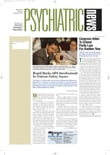A new study has found no association between tricyclic or serotonin reuptake inhibitor (SRI) antidepressants and congenital malformations or developmental delays. However, researchers did find a significant association between SRIs and premature delivery, as well as consequent lower birth weight.
“Nothing that we found would say that there is any reason for expectant mothers with depression to avoid taking antidepressants, but you do have to weigh the risk of early delivery associated with SRI antidepressants,” said Gregory Simon, M.D., M.P.H., a research assistant professor of psychiatry and behavioral sciences at the University of Washington in Seattle and first author of the report. The NIMH-supported study appears in the December American Journal of Psychiatry.
Simon and his colleagues reviewed hospital records of a large cross-sample of patients covered by a group-model health maintenance organization to identify all live births between January 1, 1986, and December 31, 1998. Pharmacy records were reviewed to identify antidepressant prescriptions filled or refilled within 270 days prior to delivery. The researchers identified 209 infants exposed to tricyclic antidepressants during pregnancy and 185 exposed to SRIs. (Only antidepressants belonging to these two drug classes were analyzed in this report.)
The researchers used gestational age, birth weight, head circumference at birth, identification of any major or minor malformation, motor delay, speech delay, and Apgar scores at one and five minutes as their primary outcome measures.
For those infants exposed to tricyclic antidepressants (subjects had been exposed to amitriptyline, desipramine, doxepin, imipramine, nortriptyline, or protriptyline), there was no significant difference in gestational age, birth weight, head circumference, or Apgar scores from a matched sample of infants not exposed to any antidepressant. In addition, babies exposed to tricyclics did not differ significantly from nonexposed babies in weight or head circumference from birth through age 2.
For those infants exposed to SRIs (including fluoxetine, fluvoxamine, paroxetine, and sertraline), gestational age, birth weight, and Apgar scores were all statistically significantly lower compared with those of nonexposed infants. Weight was significantly lower at the two-month and four-month infant visits, but not significantly different at the six-month point or beyond.
“Infants exposed to SRIs were twice as likely to be born at or before 36 weeks, which is kind of a milestone point in fetal development,” Simon told Psychiatric News. Prior to that point, premature infants may have significant respiratory difficulties, and the earlier birth occurs, the more likely infants are to also have neurological and gastrointestinal difficulties. “This is, of course, something that obstetricians do pay attention to. The risk of premature birth with SRIs is about the same (10 percent) as if the mother smokes during pregnancy—about twice the background rate of 5 percent.”
Simon’s data agree with those from previous studies suggesting a twofold increase in premature birth. “It is probably reasonable to say now that this is a real effect, given that our data back up prior studies,” Simon noted. “When it was only one study, then two, it was certainly a potential effect, but now the evidence is fairly strong.”
Simon emphasized, however, that his study is the latest of several that have found no link between prenatal antidepressant use and any difference in rates of major or minor malformations, any specific malformation, developmental delays, or other neurological disorder.
“Taken together, our study adds a larger margin of safety” to taking tricyclic or SRI antidepressants during pregnancy, Simon concluded.
Am J Psychiatry 2002 159 2055
